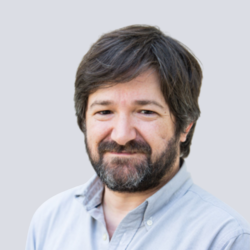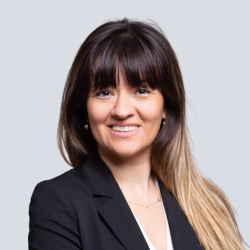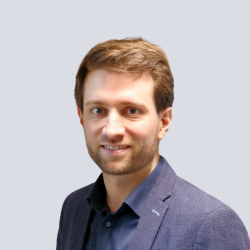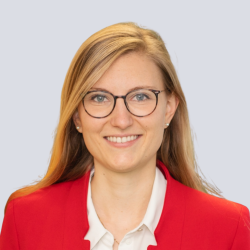Meet the organisers

Julien Calderaro
Prof Julien Calderaro is Full Professor in the Department of Pathology of Henri Mondor University Hospital in Créteil, France.
He is specialized in the field of liver diseases and tumors diagnosis. His works noticeably led to the establishment of a refined morphomolecular classification of liver cancer. He now focuses his research on the immune micro-environment of liver cancers and develops innovative, artificial-intelligence based approaches to extract meaningful prognostic and molecular data from digital histological slides.

Jan Clusmann
Dr. med. Jan Clusmann is a resident physician and postdoctoral researcher in the Clinical Artificial Intelligence group led by Prof. Jakob Kather at the TUD Dresden University of Technology, as well as in the Prevention and Data Science group led by Prof. Carolin V. Schneider at RWTH Aachen University.
He obtained his medical degree and completed his doctoral thesis with summa cum laude at the Institute of Physiology, RWTH Aachen University.
His research focuses on the integration of multi-omic data from large, population-based cohorts for risk stratification of hepatobiliary cancers, as well as on explainable artificial intelligence and AI safety in clinical settings. Dr. Clusmann has first-authored original research articles published in Nature Communications and NEJM AI, and contributes actively to the discussion and perspective on large language models for healthcare, e.g. as a co-lead on one of the first perspective articles on large language models in healthcare, published in Communications Medicine and cited over 600 times in 1 year.
He has been invited to speak on the implementation of large language models in medicine at major international conferences, including the European Congress of Radiology (ECR) and the European Association for the Study of the Liver (EASL). In addition to his research, Dr. Clusmann is committed to medical education and was awarded a prestigious RWTH Aachen Teaching Prize in 2023.

Narmin Ghaffari Laleh
Dr. rer. nat. Narmin Ghaffari Laleh is a postdoctoral researcher and AI expert in computational pathology.
She holds a Ph.D. in Computational Pathology from RWTH Aachen University (summa cum laude), where she developed weakly supervised deep learning methods to predict tumor properties from whole slide images. Narmin currently works at the intersection of academic and industrial research—dividing her time between the Clinical AI group at TU Dresden and a flagship AI initiative at GlaxoSmithKline (GSK). Her research focuses on deep learning for molecular prediction, multimodal AI, and explainable models in precision oncology. At GSK, she leads efforts to integrate spatial profiling and model interpretability into clinical decision support systems. She has published extensively in high-impact journals including Nature Communications, Nature Medicine, and The Lancet Oncology, and co-authored several influential review papers on AI in cancer research. Being passionate about education, Narmin has organized international AI summer schools, mentored junior researchers, and regularly presents at international conferences. She is committed to developing clinically useful and ethically robust AI tools for the future of medicine.

Jakob Kather
Professor Jakob Kather holds dual appointments in medicine and computer science at the TUD Dresden University of Technology, Germany, serves as a senior physician in medical oncology at the University Hospital Dresden and holds an additional affiliation with the National Center for Tumor Diseases (NCT) in Heidelberg.
His research is focused on applying artificial intelligence in precision oncology. Prof. Kather’s research team at TU Dresden is using deep learning techniques to analyze a spectrum of clinical data, including histopathology, radiology images, textual records, and multimodal datasets. Guided by the belief that medical and tech expertise needs to be combined, medical researchers in his team learn computer programming and data analysis, while computer scientists are immersed in cancer biology and oncology. Prof. Kather chairs the “Working group on Artificial Intelligence” at the German Society of Hematology and Oncology (DGHO) and is a member of the pathology task force of the American Association for Cancer Research (AACR). His work is supported by numerous European and national grants, which enable the team to develop new deep learning methods for medical data analysis techniques and to apply them in precision oncology.

Carolin V. Schneider
Carolin V. Schneider is a physician-scientist and Junior Professor of Prevention and Genetics of Metabolic Liver Diseases at RWTH Aachen University, where she also leads the Research Group for Prevention and Data Science within the Department of Gastroenterology, Metabolic Diseases and Internal Intensive Care Medicine.
She holds a secondary appointment as Adjunct Professor of Translational Medicine and Human Genetics at the University of Pennsylvania and is a visiting scientist at the German Cancer Research Center (DKFZ) in Heidelberg and the Else Kröner Fresenius Zentrum (EKFZ) in Dresden. Prof. Schneider obtained her medical degree from RWTH Aachen University. From 2019 to 2022, she conducted postdoctoral research at the University of Pennsylvania under Prof. Daniel Rader, in the department of Translational Therapeutics. Her research combines multi-omics, data science, and AI to develop stratified prevention strategies for cancer and metabolic liver diseases. Prof. Schneider has received numerous awards, including the Liver Cancer Award of the DGVS and inclusion in Forbes 30 under 30 in the category “Science and Healthcare.” She also serves on the Young Investigator Taskforce of EASL. She is part of the extended editorial board member of JHEP Reports and the Journal of Hepatology.

